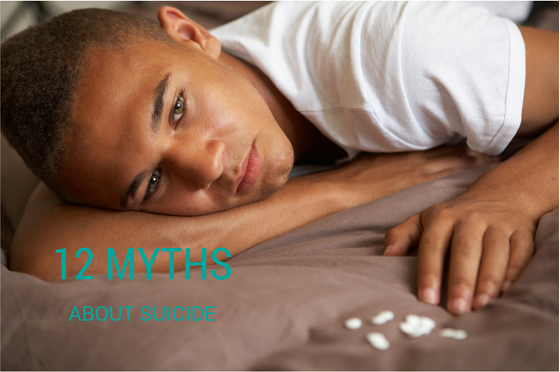Coping with suicidal thoughts or suicide attempts can be tough, whether it’s your own experience or that of a loved one. Here are 12 myths about suicide that can make it harder and more confusing.
- “People don’t give warning signs.” Actually, they usually do. Researchers say that as many as 80% of suicides provide warning signs such as talking about suicide, drawing pictures depicting suicide or death, or giving away their possessions.
- “Suicides always leave notes explaining their reasons.” 25% of suicides or fewer leave notes. When they do leave notes, suicides often don’t say why they decided to end their lives.
- “There are more suicides around the holidays.” Actually, there are fewer suicides around the time of major holidays. Suicides at Christmas time may get more press, but this is actually the time of year with the lowest suicide rate.
- “Suicide is more common in the winter.” It may be surprising, but May is the top month for suicides, and suicide is generally more common in the spring.
- “Press coverage doesn’t affect suicide rates.” Stories in the news about the suicide of a famous person cause suicide rates to increase. So do alarming stories about the economy. In fact, back when newspapers were the main source of news, researchers found that suicide rates would drop when there was a newspaper strike.
- “Suicide rates go up during war time.” While troubling stories in the news seem to increase suicide rates, the rate of suicide decreases when our country is at war.
- “Suicides are usually teenagers.” It’s true that teen suicide is increasing, but older adults also commit suicide. In fact, men are most likely to take their own lives when they are over 61.
- “Suicides are most common in big cities.” In fact, there are urban suicides but there are many more rural suicides.
- “Don’t talk to people about suicide — you might put the idea in their minds.” Actually, talking about suicide can help.
- “Don’t insist on giving people the number of a suicide hotline.” If you offer the number of a suicide hotline to a friend and they resist, you may hesitate to insist. It’s better to be a bit aggressive than to leave them without the support of that number. Write it on a card and tuck it into your friend’s purse or pocket.
- “If someone has been thinking about suicide, but their depression improves, they will not commit suicide.” If someone begins treatment for depression, they may begin to have more energy before they begin to feel happier. They may actually be more likely to take action on their suicidal thoughts at this point.
- “The effect of suicide on the survivors is the same as any death.” All deaths bring grief, but the survivors of a suicide are often more strongly affected. Having a loved one choose death may feel different from having a loved one die in an accident or from old age.

